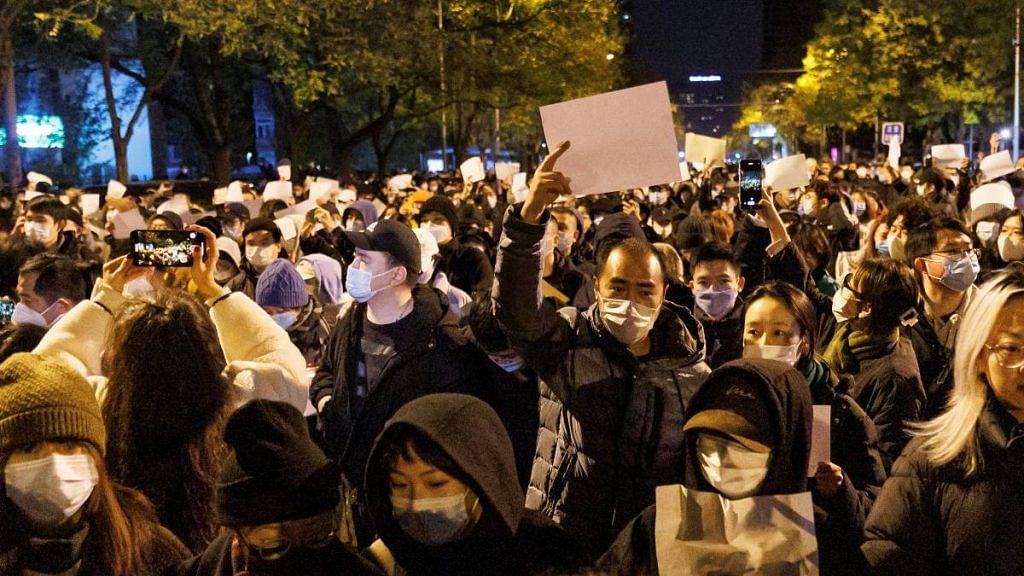New Delhi: Even as thousands of citizens continue to protest China’s draconian Zero-Covid policy, Indian students and expats seem to be largely unaware or ambivalent towards the demonstrations.
Speaking to ThePrint, two Indian students enrolled in the Hubei University of Medicine, claim they have not seen any protest or increased security presence since entering China and that most of the “action” seemed to be happening near Shanghai.
Protests sprung up over the weekend in at least 10 cities, including strikes in capital Beijing, financial hub Shanghai, and Chengdu in the country’s southwest.
The immediate cause behind the protests seems to have been a fire in a Xinjiang building which killed 10 residents, with reports suggesting that first responders reached the blaze late due to strict Covid restrictions.
While the protests started initially against China’s unending Covid lockdown policies, they metamorphosed into a larger dissent against absolute state control.
Students and activists have called for more freedom and rights in the country, along with questioning President Xi Jinping’s legitimacy — a move at par with treason in the country.
Some protestors held white sheets of paper — to symbolise the lack of freedom of speech in the country. It was, the BBC said, “speaking out without explicitly saying anything.”
Blank sheets of paper have become an iconic item during China Covid protests
Many are now referring to the movement as the "white paper revolution" or the "A4 revolution"
Follow latest ⬇️
— BBC News (World) (@BBCWorld) November 28, 2022
In a rare surge of protests in China, demonstrators called for the ruling Communist Party and its leader, Xi Jinping, to step down, amid anger at the deaths of at least 10 people in an apartment fire in Xinjiang, presumably during a strict Covid lockdown. https://t.co/7eT7YT4nHw pic.twitter.com/WT54Q0yC1M
— The New York Times (@nytimes) November 27, 2022
Also read: China should respect people’s right to peaceful protest: Human Rights Watch
Indian students haven’t seen any protests
A final year MBBS student, who is quarantined in a hotel in Kunming since 23 November, told ThePrint on condition of anonymity: “I will be able to check out from this hotel on 2 December. I haven’t seen or heard about protests in this city nor where my college is located. It seems most of the action is happening on the Shanghai side.” He is currently attending online classes from his hotel room.
A second-year at the Hubei University of Medicine, also speaking on condition of anonymity, said he was currently attending online classes from his dormitory as his campus has been under lockdown since 25 November.
“I flew into Wuhan on 8 November and at that time, the city was under lockdown. The airport had barely any people and there was a personal van to escort us to a quarantine centre nearby. On the way, I didn’t notice any protests or any increased police presence. In Wuhan, we underwent five days of quarantine. When we reached Shiyan, where the campus is located, restrictions resumed within three days,” he said, adding that while there was frustration with harsh Covid restrictions in Shiyan, no major demonstrations have happened yet.
No lockdown here, no protests
Chandru Jashnani, a textile businessman based in China for the last 22 years, said: “In my city of Shaoxing, there is no lockdown. We need to get tested every 72 hours for Covid, apart from that life is normal. My kids are going to school.”
Jashnani added the protests were mainly in “big cities like Shanghai”. “I haven’t seen or heard of anything in my area,” he said.
Shaoxing, located in the north-eastern Zhejiang province, is a manufacturing hub for textiles and electronics.
“Of course, the western media will show the protests to be larger than they are. This is usually the routine. In big cities, people are showing unity — more than anything else,” Jashnani said.
Hu Jixin, a Chinese commentator and former editor of the state-run Global Times, said, “Protests took place in many places in China over the past weekend. With the relaxation of the epidemic prevention and control measures, public sentiment will soon calm down. I can give an absolute prediction: China will not become chaotic or out of control.”
Protests took place in many places in China over the past weekend. With the relaxation of the epidemic prevention and control measures, public sentiment will soon calm down. I can give an absolute prediction: China will not become chaotic or out of control.
— Hu Xijin 胡锡进 (@HuXijin_GT) November 28, 2022
While public protests aren’t entirely a new phenomenon in China — every year there are strikes by industrial and gig-economy workers over wages — these are usually local and limited to a single issue. However, the Covid protests have found resonance across the board — overcoming this issue-region hurdle.
Also read: Chinese artist Ai Weiwei says anti-Covid protests won’t shake Xi Jinping govt
